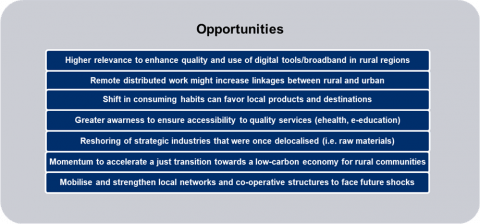COVID-19: territorial and economic impacts on European Regions

Three recently published reports offer interesting insights on the COVID-19 territorial and economic impacts on European regions. Two reports from the OECD and one report from the think tank Spatial Foresight explore the COVID-19 crisis asymmetric economic impacts on regions. The economic impacts are likely going to be long-lasting and will require regional policymakers to experiment with new policy tools to respond to emerging and urgent policy challenges, making interregional collaboration essential in these turbulent times.
The OECD published a report titled ‘The territorial impact of COVID-19: managing the crisis across levels of government’ that explores the role of regions in responding to the COVID-19 crisis. The report highlights that:
- COVID-19 has a strong regional impact, calling for differentiated governance and policy responses.
- Subnational governments are at the frontline of the COVID-19 response.
- Subnational governments have a key role to play in mobilising digital tools to better track the pandemic, tracking and testing, and inform decision-making at all levels.
- A coordinated response by all levels of government can minimise crisis-management failures.
- The medium-term economic impact will also differ across regions, based on a region’s exposure to tradable sectors, global value chains, and type of specialisation (e.g. tourism).
- The stress on subnational finance will be substantial, in the short, medium and long terms.
- National and subnational governments will be leading the economic recovery effort, including through regional and local recovery plans that are likely to include business support and stimulus packages targeting public investment.
The second OECD report is titled ‘Policy Implications of Coronavirus Crisis for Rural Development’, and it looks at opportunities and challenges for rural regions emerging from the COVID-19 crisis.
- On the short run, some rural regions might benefit from the temporary relocation of urban dwellers. Furthermore, rural areas specialised in primary activities (energy, agriculture) can be able to mitigate some of the income shocks for local firms. However, most rural regions will be negatively affected due to lower levels of broadband connection and fewer opportunities to work from home. Rural communities specialised in internationally exposed sectors (mining/oil and gas, transportation, and tourism) may be particularly vulnerable to the global slowdown.
- On the medium and long run, this crisis offers the opportunity to accelerate the digital transformation and broadband deployment in rural region, thus increasing the attractiveness for remote workers, distance-learning, and healthcare E-services. A change in social and policy preferences towards services of proximity, greater local consumption and recovery of strategic industries can increase income for rural regions.

Figure 1. Opportunities for rural regions emerging with the COVID-19 crisis. Source: OECD.
Spatial Foresight published a report titled ‘Understanding the Territorially Diverse Implications of COVID-19 Policy Responses’ that explores the territorial impact of the COVID-19 crisis. The authors point out that the COVID-19 crisis is having highly asymmetric impact across Europe and within countries due to exposure (rigidity of restriction measures per country and estimated effects on GDP for 2020) and sensitivity (employment per sector and related risk and comparative reliance on tourism sector) of European regions to COVID-19 policy responses (see map below).
Map 1. Potential territorial impacts of COVID-19 policy responses – a preliminary assessment. Source: Spatial Foresight
Have a look at the OECD website tracking COVID-19 policy responses
Interreg Europe Policy Learning Platform is committed to support COVID-19 recovery
